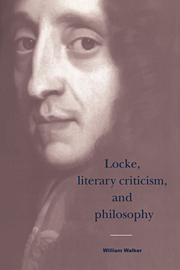Summary
Although I try in this book to identify and interpret the principal figurative representations of mind in John Locke's epistemological writing, I do not understand myself to be presenting a literary as opposed to philosophical reading of it. This is because identifying and interpreting metaphors of mind in An Essay Concerning Human Understanding are standard practices in mainstream philosophical commentary on this work from Leibniz to Rorty. Secondly, in writing a dissertation on Locke for my Ph.D. in English literature (which is how I began this book), I did not understand myself to be doing anything particularly new or radical. For reading and making claims about Locke is a standard practice of modern literary criticism that deals with post-Renaissance English literature. If literary criticism that presents readings of philosophical texts and discusses literature and its history in relation to these readings is what constitutes interdisciplinary study, then a significant portion of the most important English literary criticism of the last fifty years is an interdisciplinary study. Indeed, that is one of the main reasons I thought writing on Locke's Essay would be an important and therefore rewarding thing to do: so many literary critics had already done it, they made so much depend on it, and, most importantly, they did not, at least so I thought, do it very well. Thirdly, though I have something to say about each, I do not focus my discussion on the three “doctrines” of Locke which literary critics commonly discuss in connection with the literature and aesthetics of the eighteenth century and Romanticism: the association of ideas; the difference between wit and judgment; the difference between primary and secondary qualities.
- Type
- Chapter
- Information
- Locke, Literary Criticism, and Philosophy , pp. xiii - xviPublisher: Cambridge University PressPrint publication year: 1994

